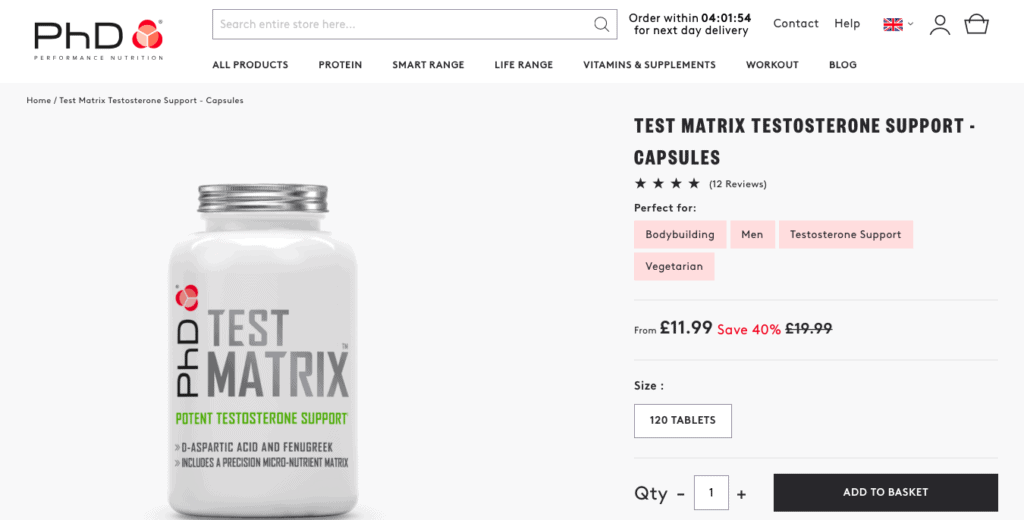Athletes, bodybuilders, powerlifters, and competitors of all kinds likely have at least one thing in common: These men care about being the best possible versions of themselves.
And what’s one major factor that makes a man, a man? You guessed it. Testosterone.
Thus, it’s no surprise that many men in these areas often try out testosterone-boosting supplements to give them that extra hormonal boost that they need when training intensely. Sadly, some of these supplements are all talk and don’t provide any benefit, leaving users spinning their wheels.
This isn’t always the case, though, as some products provide benefits. So let’s take a closer look at a specific testosterone boosting supplement called PhD Test Matrix. Is this testosterone booster one of the more promising options, or does it fall flat? We’ll find out in this ultimate PhD Test Matrix review!
About PhD Test Matrix
PhD Test Matrix is made by PhD Performance Nutrition. It is designed as a testosterone support formula for men only, especially bodybuilders and strength athletes. They claim it is their most potent and powerful testosterone support formula ever, with a number of ingredients designed to provide a high level of micronutrient support for men who are on a quest of packing on muscle and increasing strength.
PhD Test Matrix Benefits
Unsurprisingly, the main benefit of PhD Test Matrix is enhanced testosterone. They also claim that it will help to increase strength and lean muscle mass. All of this is attributed to their unique blend of vitamins, minerals, herbal extracts, and other micronutrients that is specifically formulated for men.
However, just how effective is this testosterone-enhancing formula? To see if Test Matrix truly lives up to its claims, continue reading!
PhD Test Matrix Ingredients
As mentioned, PhD Test Matrix is a blend of vitamins, minerals, herbal extracts, and other micronutrients.
Below are the specific ingredients the formula contains:
- D-Aspartic Acid (550mg)
- Ornithine-Alpha-Ketoglutarate (500mg)
- Arginine Alpha-Ketoglutarate (500mg)
- Fenugreek 4:1 Extract (300mg)
- 5-Methyl-7-Methoxyisoflavone (100mg)
- 20-Hydroxyecdysterone (50mg)
- Phosphatidyl Choline (30mg)
- Diindolylmethane (30mg)
- Born (10mg)
- Vitamin C (150mg)s
- Magnesium (57mg)
- Vitamin B6 (6mg
- Zinc (as Zinc Oxide) (5mg)
- Pantothenic Acid (5mg)
- Vitamin D3 (30mcg)
(Note: Amounts listed are based on the serving size of four capsules.)
Did you feel like a chemist reading some of those ingredients? Well, now that you’ve tongued your way through those, let’s check out to see how effective each one is.
D-Aspartic Acid
D-Aspartic acid is up first on the list, and it is one of the ingredients that are specifically featured in Test Matrix. Aspartic acid plays an important role in the endocrine and nervous systems, acting as a neurotransmitter and neuromodulator. Related to the endocrine system, a lot of research shows that aspartic acid has a significant role in the production of testosterone and other androgenic hormones, such as a luteinizing hormone. It is also necessary for the production of sperm and semen. In regard to supplementation, d-aspartic acid improves testosterone, though some studies have conflicting results. Even still, there is enough research to state that it should work.
Ornithine Alpha-Ketoglutarate
Next up is a mouthful of an ingredient, ornithine alpha-ketoglutarate (here on referred to as OAKG). OAKG is an amino acid and a precursor to a number of substances, such as glycine and arginine, and it also increases the secretion of growth hormone and other hormones. So, the logic is that increased amino acid production and growth hormone would lead to more muscle mass and strength. However, it doesn’t seem to affect testosterone production to any degree, and its effects on muscle mass and strength are inconclusive.
Arginine Alpha-Ketoglutarate
Another ingredient in Test Matrix is arginine alpha-ketoglutarate (AAKG)…perhaps this is OAKG’s brother? AAKG is a non-essential amino acid, and it helps to increase the production of nitric oxide. In turn, more nitric oxide leads to more blood flow to the muscles, possibly enhancing workouts and recovery. AAKG also may increase growth hormone levels. Lastly, AAKG supplementation is likely to enhance strength and other aspects of anaerobic performance, but the dose has to be pretty high (around 10 grams).
Fenugreek 4:1 Extract
The fourth ingredient is the funky-named fenugreek extract. Fenugreek is an herb that contains a number of compounds, such as saponins, which may increase testosterone. Basically, these compounds block enzymes that would otherwise convert testosterone to other hormones, so they help to leave more available testosterone. And the research is convincing, showing that fenugreek increases total and possibly free testosterone levels in men, including men who undergo resistance training. So it’s no surprise Fenugreek is found in many testosterone boosters, including Nugenix Maxx and TestoGen. The typical dose is around 500mg.
5-Methyl-7-MethoxyIsoflavone
Another long ingredient included is 5-methyl-7-methoxyisoflavone (5M7M). 5M7M is purported to increase protein synthesis, and it also may act as an aromatase inhibitor, which could leave more readily available testosterone in the blood. However, it appears so far that this supplement isn’t really effective for performance, strength, or muscle in resistance-trained men.
20-Hydroxyecdysterone
Continuing with the mouthful names, we have 20-hydroxyecdysterone. This compound is a steroid hormone. Thus, it plays roles in protein synthesis and may affect testosterone levels too. Overall, it seems that it is effective for increasing muscle mass and strength, and it also may help improve sexual dysfunction. Research in strength/performance studies use around 50mg.
Phosphatidylcholine
Test Matrix also contains phosphatidylcholine (PC), which is a phospholipid found naturally in all cells of the human body. You can get it in your diet from eggs, soybeans, sunflower, and other foods. However, intense exercise can deplete choline levels, so supplementing with PC may help. In fact, research shows that supplementing with PC improves performance in various sporting activities, especially in high-intensity or longer-duration events. A beneficial dose is typically around 0.2g/kg of bodyweight.
Diindolylmethane
Up next is diindoylmethane (DIM), which is a compound derived from indole-3-carbionol, found in cruciferous vegetables. DIM is known to increase good estrogens and decrease the bad estrogens, positively impacting hormonal health. However, it probably doesn’t do anything for testosterone, and some research shows supplementing with DIM may even lower testosterone and decrease sperm health.
Boron
The next ingredient is boron, a mineral found in various foods and the environment. Boron is important for the regulation of sex hormones, including, of course, testosterone. Boron helps to increase testosterone levels, and it also helps to convert total testosterone to free testosterone, as the research shows. In some cases, supplementation can almost double testosterone levels and testosterone to estrogen ratios. As one research study put it, there truly is “nothing boring about boron.” Around 6mg/day seems to be effective.
Vitamin C
Alright, now we’re getting to some more familiar-sounding ingredients, the first of which is vitamin C. Vitamin C is a potent antioxidant, so it may help to reduce the damage that occurs during hard training. Some research shows it can improve semen quality. However, supplementation appears to have no effect on muscle mass, strength, or testosterone, and may even reduce muscle mass over time.
Magnesium
Another mineral in PhD Test Matrix is magnesium. Magnesium has many roles in the body, and related to strength and bodybuilding, it is important for muscular contraction, energy, and strength. It is also has a positive effect on anabolic hormones, such as testosterone, and decreases oxidative stress and inflammation. Research shows that men deficient in magnesium and with low testosterone could benefit from Magnesium supplementation the most. Magnesium is also particularly important for strength athletes and bodybuilders because their intense training uses up a lot of magnesium, so it is necessary to take in higher amounts than the average person.
Vitamin B6
The next vitamin included is vitamin B6. Vitamin B6 is important for overall energy production, and thus it is needed when exercising or strength training. It is also important for healthy testosterone levels and impacts semen quality. However, unless you’re deficient, supplementing is unlikely to have a positive effect on muscle, strength, or testosterone.
Zinc
Test Matrix also included the essential mineral, zinc. Zinc has a number of critical roles in the male reproductive system. For example, it directly affects testicular function and testosterone production. It is also involved in converting testosterone to di-hydrotestosterone (DHT), which is the most powerful/potent form of testosterone. Lastly, it affects other androgenic hormones, including luteinizing hormone.
Unsurprisingly, supplementing with zinc in the amount of 15 to 30mg increases testosterone in men, including those who weight train. Athletes may need more zinc than others, so supplementation is particularly beneficial for them.
Pantothenic Acid
Yet another vitamin included is pantothenic acid, which is also called vitamin B5. It is important for the production of various steroid hormones, such as testosterone, and also has a role in the nervous system and adrenal glands. You also need enough B5 for optimal energy levels since it is involved in energy metabolism. However, no research definitively shows that supplementation is necessary for optimal testosterone levels and exercise performance.
Vitamin D3
The final ingredient listed in PhD Test Matrix is vitamin D3. Vitamin D actually acts like more of a hormone. Related to strength training, it has a direct effect on skeletal muscle, and higher serum levels of vitamin D are related to improved sports performance, increased strength, and injury prevention. Vitamin D is also related to testosterone, and research shows a positive relationship between vitamin D and testosterone levels. However, specifically supplementing with it may or may not increase testosterone, as the results are inconclusive.
Does PhD Test Matrix Work?
Overall, it is unlikely that Test Matrix will provide any major benefits, but you still should get some testosterone-boosting effects from it. The main positive thing about Test Matrix is that it does use a number of research-backed ingredients, such as D-aspartic acid, AAKG, fenugreek, 20-hydroxyecdysterone, PC, boron, magnesium, and zinc. Yet, for most of these ingredients, they don’t reach the beneficial dose typically used in the research. Often, they put in just a fraction of what was used in research for increasing testosterone and enhancing strength and muscle mass. It’s definitely still possible that these ingredients will work, and I’m not saying the dose “needs” to be that high, but you still aren’t as likely to get the full benefits.
Another issue with Test Matrix is that they included some ingredients that simply don’t work. Such ingredients include OAKG, 5M7M, DIM, panthothenic acid, and vitamin D3. To be fair, some of these could work, but there isn’t enough evidence to back them up yet. Overall, these ingredients aren’t a major downfall of Test Matrix, but they still don’t really add value to it.
Claims vs. Reality
So, will PhD Test Matrix boost testosterone and enhance muscle mass and strength? Maybe. They have enough ingredients in there that are proven to do these things, and even though the amounts are lower than what is optimal, combining them together may make up for the lack of an effective dose. But I can’t say for sure. If you’re on the fence, I’d say it’s still worth trying out.
Who is PhD Test Matrix Best for?
In line with what they market, Test Matrix is likely best for strength athletes, bodybuilders, and the like. This is because Test Matrix uses ingredients that are specifically beneficial for those individuals. Anybody who engages in intense weight training is likely to need more nutrients than the average person, and they also may benefit from herbs and other things to mitigate the potential hormonal decrease that can occur from intense training. And even though the amounts are lower than what is optimal, Test Matrix does have all of these things, so you could use it as a way to help you reach your nutrient goals and protect yourself better from some of the damages of intense training.
Is PhD Test Matrix Safe?
Test Matrix is a pretty safe product overall, but here are some things to look out for:
- D-aspartic acid sometimes produces irritability, nervousness, rapid heart rate, and headache.
- AAKG rarely leads to dizziness and vomiting.
- Fenugreek affects blood sugar and may cause some digestive symptoms (e.g., nausea)
- PC may cause bloating and diarrhea, but usually only in excessive doses.
- DIM is related to digestive tract symptoms, headaches, and other mild symptoms.
- Other mild side effects may occur from various vitamins and minerals, but these are rare.
Where to Buy PhD Test Matrix
If you want to give Test Matrix a shot, you can buy it on the PhD Performance Nutrition website here.
Each bottle of PhD Test Matrix contains 120 capsules, which is equivalent to 30 servings. They actually have the price listed in pound sterlings, and in that currency it is 11.99, which is $16.42. So, it’s a little over 50 cents per serving, which is pretty cheap for most.















